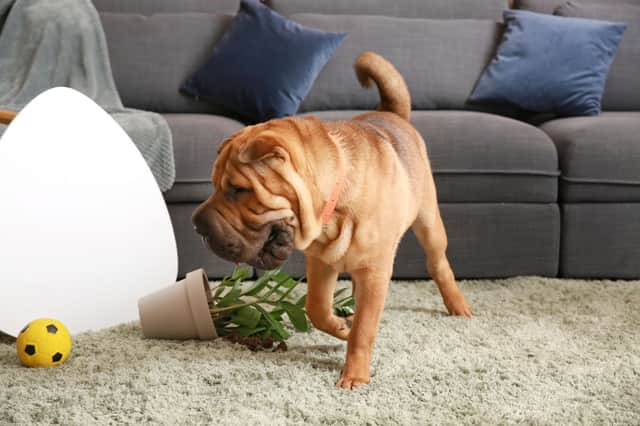Destructive Dogs: Does insurance cover pet damage, what's the damage and how to prevent it 🐱🐶


We wouldn’t be without our beloved pets, but they could create thousands of pounds worth of damage to your property.
A common misconception is that a standard home insurance policy covers pet damage or accidental damage caused by cats and dogs, leaving homeowners liable to significant unexpected costs.
Advertisement
Hide AdAdvertisement
Hide AdA study by home insurer Saga has found that a 64 per cent of pet owners have experienced pet property damage - with 24 per cent being forced to shell out between £500 and £1000.
Saga’s own data reveals one claim involving a pet totalled £1,584 after their carpet was ruined by an unwell dog.
To help homeowners understand their level of cover, Saga’s home insurance expert, Anna Thunstrom, has offered advice to those who own or are considering getting a pet - while dog behaviourist expert, Debby Lucken, advises how to avoid damage.
Here’s what they had to say.
Is pet damage covered in a standard home insurance policy?
Many don’t. A common misconception is that a standard home insurance policy will provide cover for either pet damage or accidental damage. In fact, when asked if Brits knew if their home insurance policy covered damage by pets, 41 per cent said they were unsure.
Accidental damage cover, which may include pet damage cover specifically, doesn’t always come as standard with home insurance policies. In fact, it’s often excluded. Many companies offer it as an optional extension, or sometimes within a higher level of cover. However, it’s important to note that if accidental damage is included in a policy, this is different to pet damage cover which is a separate type that can typically be categorised as chewing, scratching, tearing, or fouling.
Pet owners need to read their policy carefully to understand what’s covered. Some people assume that their accidental damage insurance will cover the costs of fouling on the carpet or chewed sofas for example, but this isn’t always the case.
The impact of pet damage in the home
Pet damage can be costly. The survey revealed that nearly a quarter (24 per cent) of Britons experienced damage ranging from £500 to £1000, and almost one in 10 (9 per cent) experienced damage up to £2,000.
Saga’s claims involving a pet show one pet damage incident totalled £1,584 after a poorly dog was very unwell on the customer’s carpet. Another incident classed as accidental damage rather than pet damage because of its nature totalled £1,248. The customer accidentally dropped two expensive tech items after tripping over their cat.
Advertisement
Hide AdAdvertisement
Hide AdAnna says: “Some people think they don’t need additional cover because their pets are well-behaved. However, it’s difficult to anticipate when they may get ill or cause costly damage. Especially when training a new puppy, there may be incidents like fouling indoors or chewing around the home, which is common during this time.
“I recommend reviewing your policy documents or getting in touch with your provider if you’re getting a new pet to make sure you have the appropriate level of cover to suit you.”
How can I prevent pet damage?
To help out dog behaviourist, trainer, and founder of Kids Around Dogs, Debby Lucken has shared her five expert tips to help prevent pet damage, explaining: “It’s important to remember negative behaviour can sometimes be caused by more serious problems, such as physical or mental health issues. I recommend having your pet checked by a vet to rule this out.”
- Hire a qualified, positive trainer who will work with you and your pet to address specific issues, keeping in mind your lifestyle, your pet’s environment, nutrition, mental and physical stimulations, and more.
- Give your pet an outlet. Chewing is natural behaviour that needs satisfying. It often indicates your dog is bored, overstimulated, self-soothing or needs attention. Always have a chew toy at your dog’s disposal and a ‘special occasions’ chew toy they get at certain times to keep them interested. This can include bones from the butcher, or hollow toys filled with healthy spreadable food to lick and eat. Naturally it’s also wise to keep precious items out of reach from pets and perhaps consider installing stairgates and playpens.
- Provide scratching posts. Similarly, cats need to file their claws, and to them, scratching furniture gets the job done. To avoid this, redirect them towards a scratching post (or more than one), or an old piece of furniture you don’t care about anymore.
- Engage in sniff games. Make sure walks are enjoyable for your dog by going to places where they have a lot of opportunities to smell. Give them enough time to sniff too without rushing. Most pets also enjoy finding hidden treasures, so you could hide some special treats or toys around the home for dogs, cats, rabbits and other pets too.
- Avoid overstimulating your pet. Exercising and amusing your pet is crucial but be careful to not overdo it. You risk overstimulating them, or getting them overtired, which can equally prompt undesirable behaviour around the home. Like humans, when we’re tired, we can get moody.”
Comments
Want to join the conversation? Please or to comment on this article.